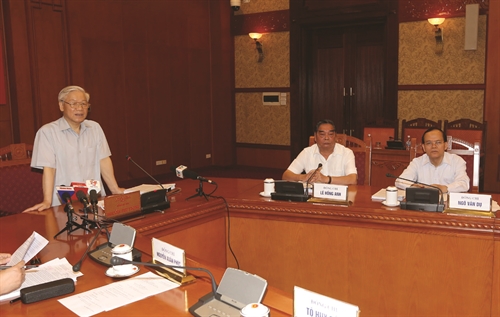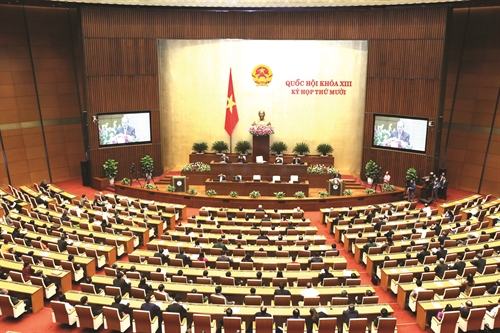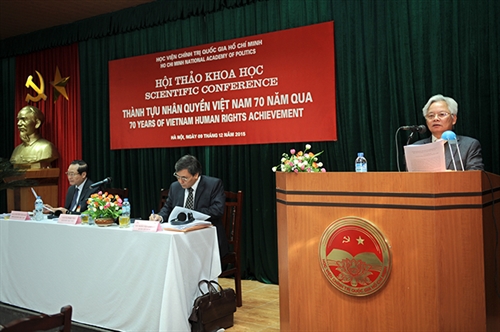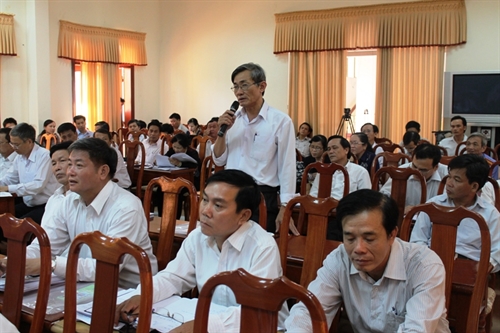Under a National Assembly resolution adopted in 2014, the Ministry of Justice was tasked to ensure the implementation of the 2013 Constitution, enhance its role in improving the quality of legal documents and draft a new Law on Promulgation of Legal Documents. Vietnam Law & Legal Forum talks with Minister of Justice Ha Hung Cuong about the results achieved after nearly two years of implementing the Resolution.
In its Resolution No. 75 adopted in 2014, the National Assembly assigned the Ministry of Justice to implement a raft of measures to ensure the implementation of the 2013 Constitution. Could you brief us about what the Ministry of Justice has done over the last two years to fulfill the task?
On the basis of the Plan to implement Resolution No. 75 issued by the Prime Minister in July 2014, which identifies three groups of tasks to be done to ensure the enforcement of the 2013 Constitution, the Ministry of Justice drew up its own plan and has implemented it with certain results.
The Ministry of Justice, together with other related agencies, developed materials and held a national videoconference on the 2013 Constitution for law disseminators. We also organized many training workshops to introduce the contents, spirit and significance of the new Constitution for state officials at the central level.
Particularly, the Ministry and other agencies launched a year-long national contest about the Constitution. With nearly five million entries, the contest, as commented by Prime Minister Nguyen Tan Dung at the award ceremony, was a significant political-legal event of great social impact.
The Ministry is now working with the National Assembly Office on a book on the significance and importance of the 2013 Constitution and the concretization of the Constitution’s provisions in the codes and laws passed by the National Assembly in 2014 and 2015.
In order to make a list of legal documents that must be annulled, revised, supplemented or issued in conformity with the new Constitution, the Ministry has requested ministries, sectors and agencies to review legal documents they had issued. In late 2014, we submitted the Prime Minister a report proposing revision, cancellation and issuance of 282 documents out of a total of 102,306 legal documents reviewed. With regard to legal documents on human rights, the Ministry and other ministries and agencies reviewed a total of 172 laws and ordinances and 7,828 sub-law documents and propose revision, replacement and issuance of 36 laws and ordinances and 50 other legal documents.
 |
| National Assembly deputies vote to pass the amended Civil Code on November 24, 2015__Photo: Phuong Hoa/VNA |
Under the Prime Minister-issued plan to implement Resolution No. 75, the Government is assigned to draft 74 out of 89 laws and ordinances for the enforcement of the 2013 Constitution. The Ministry of Justice has assisted the Government in preparing proposals on the law- and ordinance-making programs of the past two years 2014 and 2015, assigning drafting agencies and putting forward measures to ensure the quality and timely submission of draft documents.
To date, the Government has submitted to the National Assembly for passage 50 draft laws, ordinances and resolutions governing such important issues as the organization of the state apparatus and political system; human rights and basic rights and obligations of citizens; economic, social and environmental issues; and national defense. These include the Law on Organization of the Government, the Law on Organization of Local Administration, the Penal Code, the Civil Code, the Investment Law, the Enterprise Law, the Law on Marine and Island Resources and Environment, and the Law Amending the Law on Commanders of the Vietnam People’s Army.
At the proposal of the Ministry of Justice, a consultation council has been set up to appraise draft laws and ordinances that directly implement the 2013 Constitution. The Council has so far appraised 23 important draft laws and sent its suggestions to the drafting agencies for study and revision of the draft laws.
What are the Ministry of Justice’s appraisal and examination measures to improve the quality of legal documents as required in Resolution No. 75?
The Ministry of Justice has made important results in the appraisal and examination of legal documents. We have detected, and timely proposed drafting agencies to revise, inconsistent, overlapping, unreasonable or infeasible provisions in both draft or issued legal documents, many of them are related to the rights and interests of people and citizens.
Thanks to these efforts, the quality of legal documents has been improved, better ensuring the legal system’s conformity with the Party’s guidelines and policies as well as constitutionality, lawfulness, consistency, synchronicity and feasibility, and enhancing the effect and effectiveness of state management.
However, there remain shortcomings in the appraisal and examination of legal documents which, in some cases, only focus on technical aspects and fail to detect in time infeasible and impractical regulations. In order to redress these shortcomings, the Ministry of Justice has developed and is applying several solutions.
Firstly, the coordination between the Ministry of Justice and drafting agencies should be increased. The Ministry of Justice should participate in the drafting process right from the beginning so as to find and propose measures to deal with overlapping or inconsistent provisions or legal loopholes.
Secondly, it is necessary to organize training for officers engaged in the appraisal and examination of legal documents at central and local levels so as to raise law- and policy-analyzing and making capacity and appraisal and examination skills.
Thirdly, measures should be taken to involve the public in the formulation, appraisal and examination of legal documents and improve the cooperation of the Ministry’s units in the formulation, appraisal and examination of legal documents and control of administrative procedures.
Lastly, the appraisal and examination of legal documents should be combined with the supervision of law enforcement so as to timely detect and remove inappropriate provisions.
Over the past few years, delay in the issuance of implementing regulations has caused many difficulties to law enforcement activities. According to a recent government report, by October 21, 2015, the Government and ministries still “owed” 57 documents, including 12 decrees, 36 circulars and nine joint circulars detailing 19 laws which have come into force. So, what are the Ministry of Justice’s solutions to this problem?
It is true that state agencies, people and businesses have faced numerous difficulties arising from the delayed issuance of implementing regulations. To address the situation, the Ministry of Justice has proposed many solutions to the Government.
The first is to improve discipline in this work. Ministers and heads of ministerial-level agencies must personally direct and assign duties to each unit and individual in the study, drafting and submission of documents and strictly handle those who fail to ensure the quality and timely issuance of documents.
The second solution aims at increasing coordination between professional units and legal affairs departments and between drafting ministries or agencies and the Ministry of Justice, the Government Office and other related agencies in the process of compiling and revising draft laws and ordinances as well as drafting and issuing implementing regulations. Together with other ministries and sectors, the Ministry of Justice has assigned officials to take part in the drafting process right from the beginning so as to raise the quality of documents and reduce the appraisal time.
The third solution is to press for the drafting and issuance of documents by ministries and agencies and report on results to the monthly cabinet meetings. Information on the issuance of implementing regulations is also published on the e-portals of the Government and the Ministry of Justice for public monitoring.
Thanks to these efforts, positive results have been seen in this work. By December 21, 2015, the number of “owed” documents has reduced to 35, including four decrees, seven joint circulars and 24 circulars.
In the coming time, in order to thoroughly tackle the delay in the issuance of implementing regulations, in addition to the above-mentioned solutions, the Ministry of Justice will continue advising and assisting the Government in effectively implementing the 2015 Law on Promulgation of Legal Documents, ensuring the availability of implementing regulations when the laws and ordinances take effect.
I want to emphasize that this is an imperative at a time when Vietnam has concluded new-generation free trade agreements like the Trans-Pacific Partnership Agreement and the Vietnam-EU Trade Agreement under which foreign investors can take our government to international justice bodies if the issuance of legal documents cause harms to them.
The revised Law on Promulgation of Legal Documents will come into force on July 1, 2016. What are new provisions of the Law?
The 2015 Law on Promulgation of Legal Documents inherits provisions of the 2008 Law on Promulgation of Legal Documents and the 2004 Law on Promulgation of Legal Documents of People’s Councils and People’s Committees and contains a number of new points which are expected to create breakthroughs in legislative work.
Firstly, the Law introduces a more concise definition of a legal document. While still stating that legal documents must be promulgated according to the competence, order and procedures and in a form prescribed by law, the Law adds that “legal documents contain legal norms.” This provision helps identify what issues must be provided in legal documents and which agencies and persons are competent to issue such documents.
Secondly, in a bid to further simplify the system of legal documents, the Law specifies the competence to issue legal documents. Particularly, it abolishes five types of legal documents, including joint resolutions between the Standing Committee of the National Assembly or the Government and a central agency of a socio-political organization, except joint resolution between the Standing Committee of the National Assembly or the Government and the Presidium of the Central Committee of the Vietnam Fatherland Front; joint circulars between ministers and heads of ministerial-level agencies; and directives of provincial-, district- and commune-level People’s Committees.
Thirdly, the Law adds the principle of ensuring publicity and democracy in the receipt of and response to public opinions during the drafting and issuance of legal documents. At the same time, it requires that opinions of those directly affected by legal documents be conducted from the policymaking stage to the drafting stage.
Fourthly, the Law provides that law- and ordinance-making programs will be developed on an annual basis with a view to increasing proactiveness and flexibility in legislative work. Particularly, the Law separates the policymaking process from the process of drafting legal documents, incorporating the policy analysis process in the stage of making proposals for formulation of laws, ordinances and resolutions of the National Assembly and National Assembly Standing Committee, decrees of the Government and resolutions of provincial-level People’s Councils.
Fifthly, the Law adds a mechanism that helps National Assembly deputies exercise their constitutional right to put forward legislative initiatives. Under this mechanism, National Assembly deputies may request the National Assembly Office, Office of the National Assembly deputies’ delegation or the Legislative Research Institute to support them in preparing law- or ordinance-making proposals. The National Assembly Office must ensure necessary conditions for National Assembly deputies to exercise this right.
Sixthly, the Law prohibits the establishment of administrative procedures in legal documents of the Chief Justice of the Supreme People’s Court, Procurator General of the Supreme People’s Procuracy, ministers, heads of ministerial-level agencies; the State Auditor General; People Councils and People’s Committees at all levels and local administrations in special administrative-economic units, except special cases prescribed by law.
Seventhly, the Law provides more clearly and reasonably cases of issuance of legal documents according to fast-track procedures. Compared to the 2008 Law, the Law adds three cases, including urgent response to natural disasters, epidemics, fires and explosions; urgent situations for solving practical problems under decisions of the National Assembly; and suspension of the effect of a legal document in part or in whole for a certain period.
Eighthly, the Law specifies legal responsibilities of competent agencies, organizations and persons in the drafting and issuance of legal documents. If the quality of a draft document is poor, the drafting is behind schedule, or the document is unconstitutional, unlawful or inconsistent, the heads of the related agencies must be held responsible for their failure to fulfill their duties and, depending on the seriousness of their violation, face disciplinary action in accordance with the law on cadres and civil servants and other relevant laws.
Finally, the Law states that the State has the responsibility to attract, train and employ civil servants involved in the drafting and issuance of legal documents; modernize equipment and technical facilities, and ensure adequate funding for this work.-









